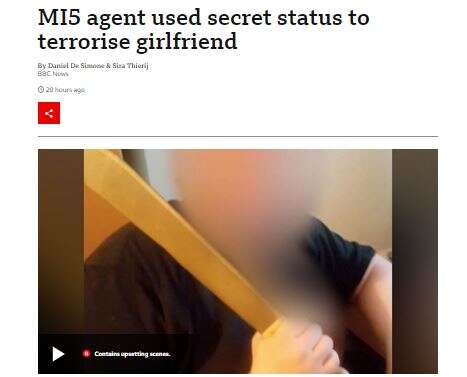
The BBC has published allegations that an MI5 spy abused and threatened to kill two of his former partners after a legal battle with the Attorney General came to a close.
High Court judge Mr Justice Chamberlain ruled this week that the BBC was able to make its own decision about how much descriptive information to use about the agent in its reporting.
The Government had submitted a long list of descriptors it wanted banned, including his appearance, tattoos, racial or ethnic origin, nationality, and heritage. The BBC said banning any description of his appearance was “too broad” but agreed it would not use his name, voice or accent.
His judgment said: “…there is no reason to doubt that the BBC will decide what can and cannot be shown and said in good faith and responsibly.”
Attorney General Suella Braverman had taken the BBC to court seeking an injunction to stop the informant from being named as she claimed it would pose a risk to his life and to national security. The action came after the BBC put the allegations to the Government in standard pre-publication protocol.
The judge said it was normal for publications to be told in injunctions only that they could not publish any information “likely to lead to” the identification of someone, leaving it to their own judgment.
He said: “Both sides agree that the order will contain a general provision prohibiting publication of information which directly or indirectly identifies X. In general, there is no need to supplement that by specifying particular categories of information whose disclosure would be identifying; and doing so would impose an unjustified interference with the BBC’s freedom of expression. For example, an order whose effect is to prohibit the BBC from publishing any information about X’s appearance might be thought to prevent them from showing any part of the video… (even with his face and other identifying features obscured) or, indeed, from describing his build.
“It is possible to imagine more detailed or particular descriptions of X’s appearance that would be likely to lead to his identification. But there is no reason to doubt that the BBC will decide what can and cannot be shown and said in good faith and responsibly. It will of course be aware of the need to comply with the general prohibition on directly or indirectly identifying X and of the consequences of non-compliance.”
But he admitted it was an “unusual if not unique” case because the BBC has not been shown some of the material relevant to his decision.
He said: “Although the BBC is experienced at reaching judgments on what would and would not be identifying, its judgments cannot take into account closed evidence.”
The BBC was also unusually not allowed to see the full reasons for the judge’s decisions in the case.
Following the final judgment being handed down, the BBC said: “This ruling enables us to tell a story we believe is firmly in the public interest, and it is a vindication of the BBC’s investigative journalism.”
On Thursday the corporation published its story, revealing allegations that an MI5 spy had abused his partner and threatened her life before moving abroad to continue carrying out intelligence work for another organisation while under a terrorism investigation. While in the other country, he started another relationship in which he demonstrated very similar violent and threatening behaviour.
The BBC also described the man as a “right-wing extremist with a violent past”.
However the story noted he could not be named “despite evidence he is a threat to women, after the government took the BBC to court to block publication”. The corporation felt identifying the man was in the public interest as it would protect potential future victims from harm.
Introducing the story on Thursday night’s 6pm news bulletin, BBC News presenter Sophie Raworth said: “The BBC knows his name, but the government went to the High Court to stop us revealing it, saying it risks national security. But critics say it means other women are still in danger.”
Daniel De Simone, one of the BBC News journalists behind the story, tweeted: “Really relieved to finally publish our report and tell the women’s stories. Exposing misogynistic abuse of this kind is plainly in the public interest, but it took an unprecedented court battle with MI5 and the government to be able to run this piece.”
The BBC has been praised by journalists across the board for its pursuit of the story. FT news editor Matthew Garrahan tweeted that it was “brilliant and brave journalism by the BBC”.
Picture: Shutterstock
Email pged@pressgazette.co.uk to point out mistakes, provide story tips or send in a letter for publication on our "Letters Page" blog
